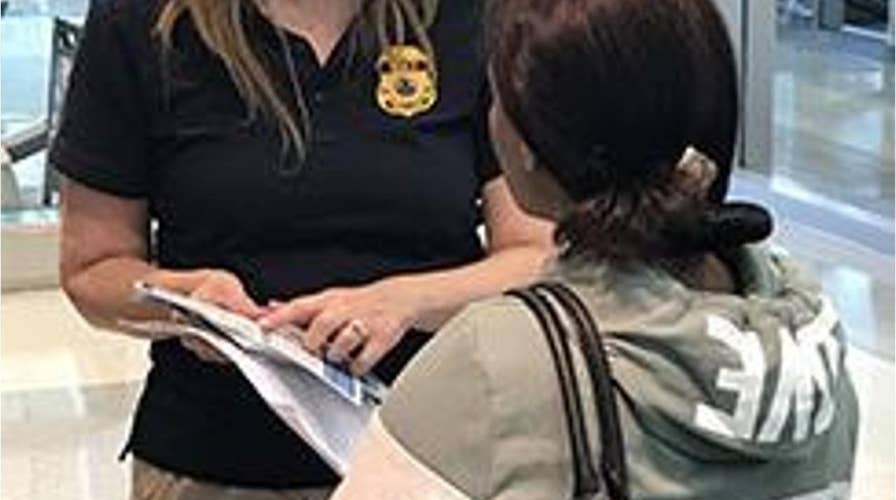ICE war crimes unit ramps up efforts at U.S airports to stop female genital mutilation
ICE war crimes unit is ramping up efforts at U.S airports to stop female genital mutilation. The new tactic was piloted at JFK before being rolled out to 14 other airports.
Less than a month before she turned 11, F.A Cole was plucked from her childhood home in Sierra Leone and marched to the woods. Confused and afraid, she was blindfolded, stripped naked, gagged and pinned down – a cutter looming over her writhing body to perform the invasive cultural ritual of female genital mutilation, better known as FGM.
Having also survived other such brutal forms of sexual violence such as childhood sexual assault and rape, as her homeland descended into 11 years of civil war beginning in 1991, Cole maintains that nothing is as scarring as FGM. It's not just the health complications, physical injury and unfathomable pain – it’s the recurring nightmares and wincing memories that can never be anesthetized.
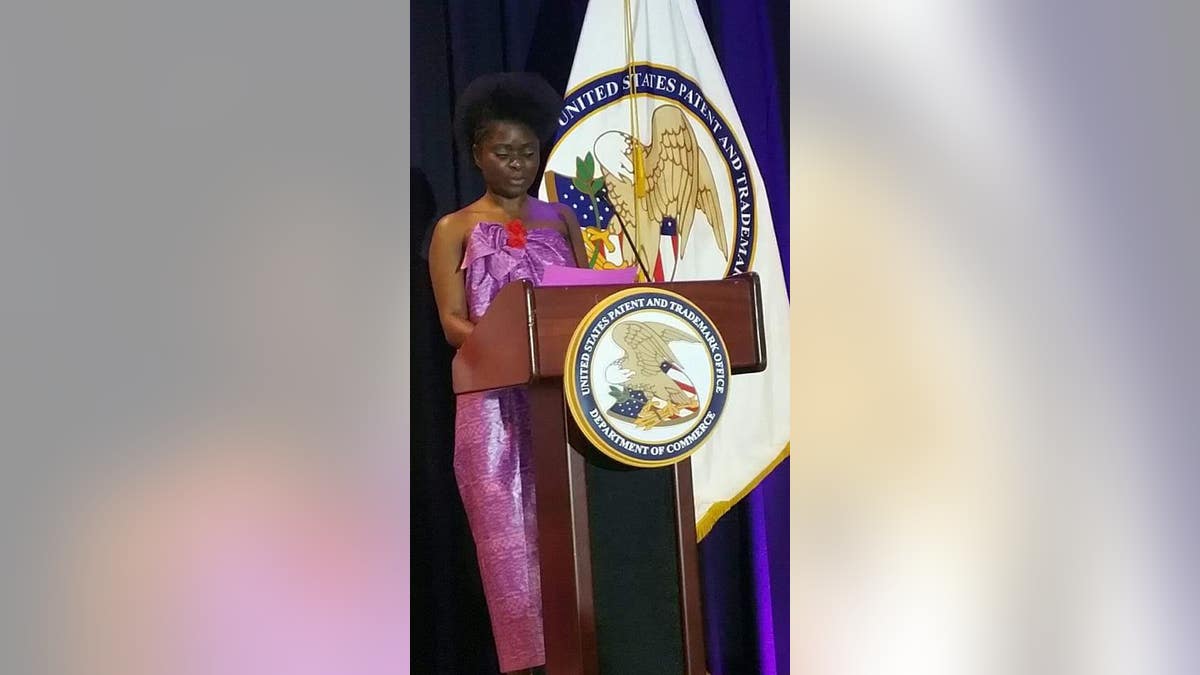
FGM survivor and activist against the practice, F.A. Cole (F.A. Cole)
“I still suffer from PTSD, anxiety and panic attacks. I can’t read stories about it,” Cole, 47, told Fox News. “And words like razor blade still trigger me into breakdowns.”
Now based in Maryland, Cole has become one of the nation’s most passionate voices against the illicit practice. Last year, she was quietly informed about a woman in her community who was planning to take her pre-teen daughter outside the country to undergo “vacation cutting” – a violation of U.S. laws – and so she alerted authorities. The mother, she claimed, tried it again a couple of months later – but this time, the child’s name was flagged in the system maintained by the Department of Homeland Security.
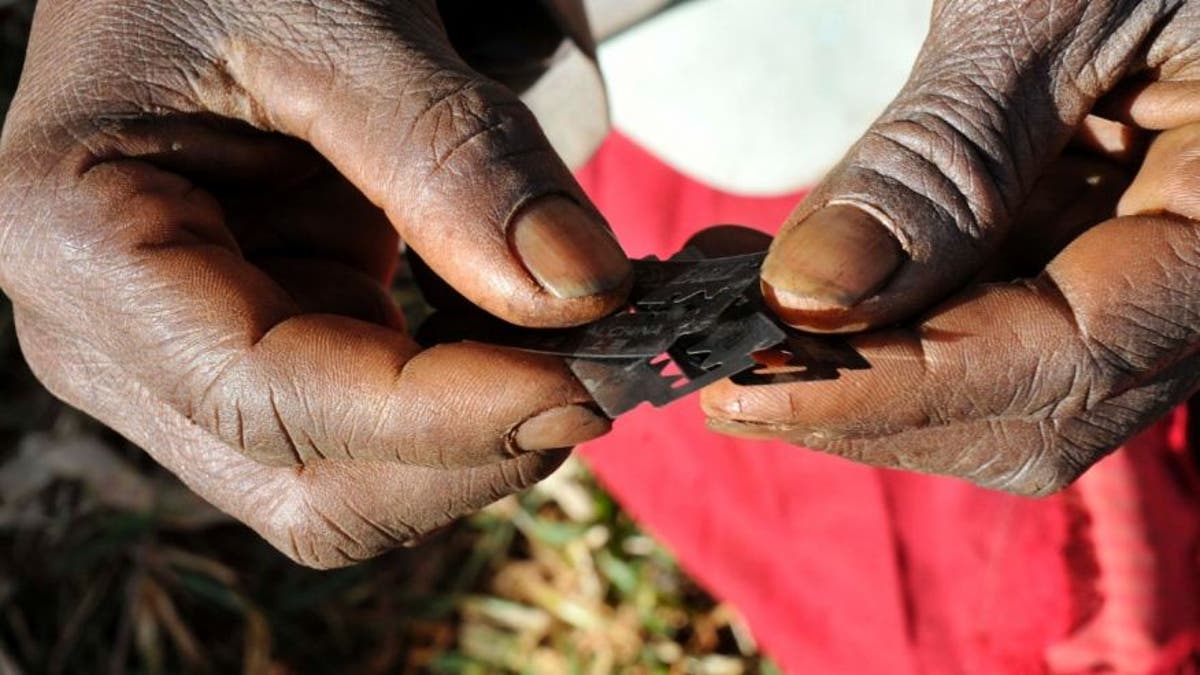
Razor blades often used before carrying out female genital mutilation. (REUTERS/James Akena)
For now, it is one young female spared from enduring the nightmare Cole herself had no choice but to suffer through – and a microcosm of broader efforts across the United States to protect at-risk girls from the barbaric practice, with airports across the country now focal points across the country to squash the act.
Over the summer, the U.S. Immigration and Customs Enforcement’s Homeland Security Investigations War Crimes Unit – which has spent three decades investigating and apprehending human rights violators – launched Operation Limelight USA. The aim is to “inform travelers of the dangers of female genital mutilation and the consequences for those who commit this horrific abuse.”

JFK is one of several U.S. airports for the new ICE initiative Operation Limelight USA (iStock)
Trained HSI agents now speak daily to hundreds of travelers before departure about the legal repercussions of enabling FGM, and offer recourse for victims or potential victims to seek assistance.
“What is unusual about this program is that it is being led by an investigations agency,” said Mark Shaffer, Unit Chief of the HRVWCU. “Initially, we thought it would be a viable investment to investigate and eventually prosecute, but what it has turned into is really an outreach program. If we reach the point where we have to arrest and prosecute, then it is a failure on our part not to get the word out that this is a crime.”

Special agents with U.S. Immigration and Customs Enforcement Homeland Security Investigations launched Operation Limelight USA at Washington Dulles International Airport. The program is designed to increase public awareness about female genital mutilation and help to deter its practice. (ICE/HSI)
Shaffer's team specifically targets flights going to Europe or other major hubs where FGM is highly prevalent. Once passengers have passed the gate, having submitted their boarding pass, agents – often joined by medical professionals, non-governmental experts and other federal officials – will look for families and thus conduct a brief, voluntary discussion on the topic.
“We talk about the laws and legalities behind it. You never know who you will end up talking to,” he continued, noting that they also hand out flyers emphasizing the law and offering resources for victims and survivors, and a tip line for passengers to call with further information. “We are trying not to have to prosecute. We are very clear that this is a crime and a very serious human rights abuse, and if we find out you did it despite our conversation, we will investigate and prosecute you to the fullest extent of the law.”
MALE RAPE EMERGING AS ONE OF THE MOST UNDER-REPORTED WEAPONS OF WAR
FGM is considered a culturally based, global concern that the U.S. characterizes as child abuse when performed on those under the age of 18. It is generally motivated by the belief that it is the only way to ensure premarital virginity and marital fidelity and involves different levels of partial or complete removal of the female external genitalia or genital organs. Mainly practiced in Africa, Asia, and the Middle East, it is estimated to have been done to more than 200 million females alive today, according to ICE.
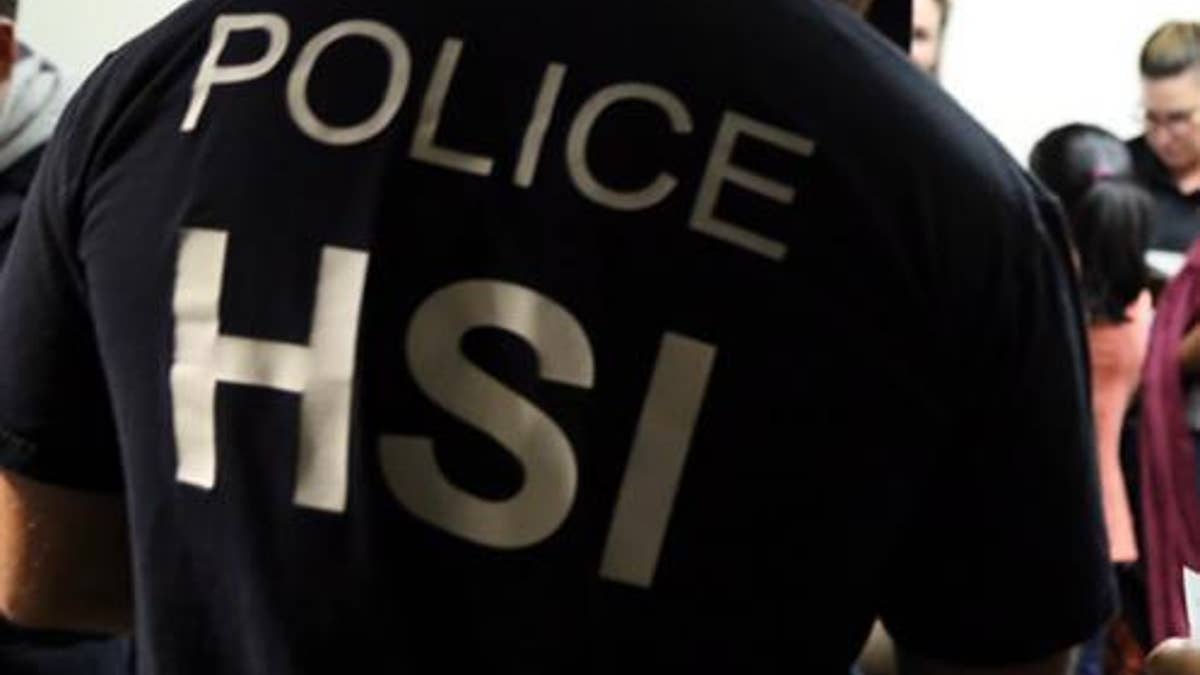
Homeland Security Investigations (HSI) agents conducted a community outreach operation at the San Francisco International Airport (SFO) to educate some and remind other travelers about female genital mutilation (FGM) and HSI’s commitment to help the U.S. Government to end this practice. (ICE/HSI)
Sometimes referred to as “female circumcision,” the U.S. State Department mandates that the practice has no health benefits and can lead to such immediate health repercussions as infections, fistula, increase in HIV/AIDS risk, and death.
Shaffer acknowledged that his specialized unit had long been looking for ways to respond to the FGM crisis and that they were struggling to figure out exactly where it was happening, who was doing it, and how it was being facilitated. In 2016, he found out about a program conceived in the U.K called Operation Limelight, built around police officers talking to passengers at London’s Heathrow Airport – which thus inspired the slightly modified American version.

Special agents from U.S. Immigration and Customs Enforcement's (ICE) Homeland Security Investigations (HSI)
It was piloted at New York’s JFK for a year before being rolled out in 14 other major airports in recent months and will be implemented in 19 airports by 2020.
Suzanne Priest, National Program Manager for the HRVWCU underscored that the biggest hurdle is “not knowing what we don’t know” and gathering information on the procedure, which falls under a veil of silence in communities given its sensitivity.
“Once this has happened, it is too late. Children are told to lie about it; they are told they will die if they tell someone, so it is frustrating on all levels,” she said. “But if we can prevent one child from having this done, we have done a good job. If we can prevent a whole bunch from having this done, then that is definitely worth our time and resources.”

San Diego ICE Homeland Security agents conduct weeklong FGM awareness outreach for travelers at San Diego International Airport. (ICE)
While the UK and the US have shored up a robust information-sharing system for their respective Operation Limelight programs, Shaffer said the next step is to involve other countries in the sharing of intelligence and trends on FGM, along with increased domestic training and bolstering partnerships with other law enforcement, medical professionals and NGO's.
Yet given the challenges associated with the hushed nature of the crime and the difficulties of passing immigration-centered bills, the unit relies on having sufficient legislation in place that shutters any loopholes.
A case in Michigan last year, brought against Dr. Jumana Nagarwala – accused of performing FGM on more than one hundred girls – induced outrage after the judge deemed the 1996 federal ban on FGM unconstitutional. The case marked the first since the statute was enacted 22 years earlier, but was explicitly shot down because the allegations did not impact interstate commerce.
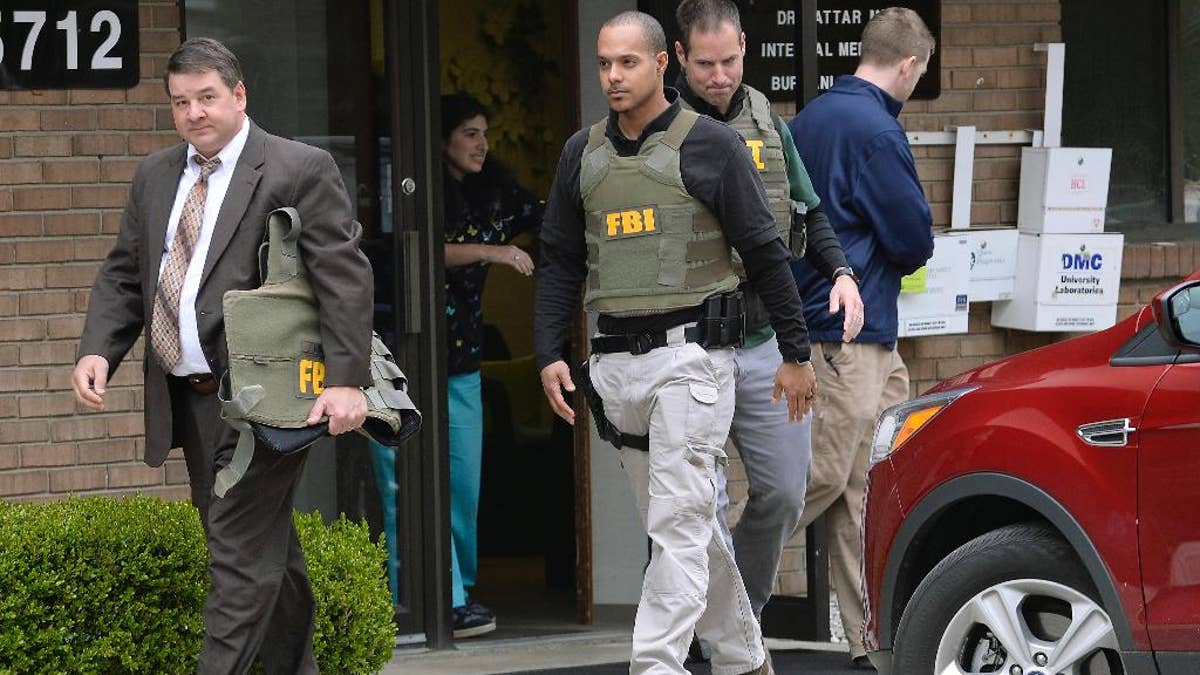
FBI agents leave the office of Dr. Fakhruddin Attar at the Burhani Clinic in Livonia, Mich. Friday, April 21, 2017, after completing a search for documents. The investigation is connected to the case of Dr. Jumana Nagarwala, of Northville, charged with performing genital mutilation on two young girls from Minnesota. (Clarence Tabb Jr. /Detroit News via AP) (The Associated Press)
The Department of Justice thus recommended legislation to tighten the impact of FGM economically for future cases, which several representatives are endeavoring to do.
In June, Gov. Tom Wolf doubled-down on the issue at a state level, making the act of FGM a first-degree felony in the state of Pennsylvania. As it stands, 15 states have yet to criminalize the practice.
That same month Sen. Martha Blackburn, R-Ten., and Rep. Scott Perry, R-P.a, proposed the Federal Prohibition of Female Genital Mutilation/Cutting Act of 2019 in the Senate and House, respectively. The bill adds six provisions explicitly related to interstate commerce and awaits a potential vote.
“Over 200 million little girls are at risk of being subjected to this horrific practice worldwide, with over a half-million right here in the United States,” Perry stated, citing the most recent statistics from the Centers for Disease Control and Prevention. “We must be abundantly clear that this cultural practice has no medical benefit and won’t be tolerated in the United States of America.”
And the road to ending FGM, to ensure there is no tolerance of it in any pocket of the nation, remains a long and winding one for its tireless activists.

Female Genital Mutilation remains a largely silent crime (iStock)
Cole pointed out that a one glaring cause for concern in some U.S. communities now is that mothers, now armed with the knowledge that “vacation cutting” is becoming more challenging given law enforcement’s growing crackdown, are banding together to “sponsor” a cutter to perform the ritual in the cloak of secrecy at someone’s house.
“They are finding crafty ways to get around the laws, so we have to keep trying to stop it,” she added. “It is something you never get over. I felt so betrayed, so abandoned. FGM traumatizes. I don’t want another girl to suffer.”
Individuals who have information about victims or perpetrators of FGM are urged to submit a tip, anonymous or otherwise, to HRV.ICE@ice.dhs.gov or call the toll-free tip line 1-866-347-2423
